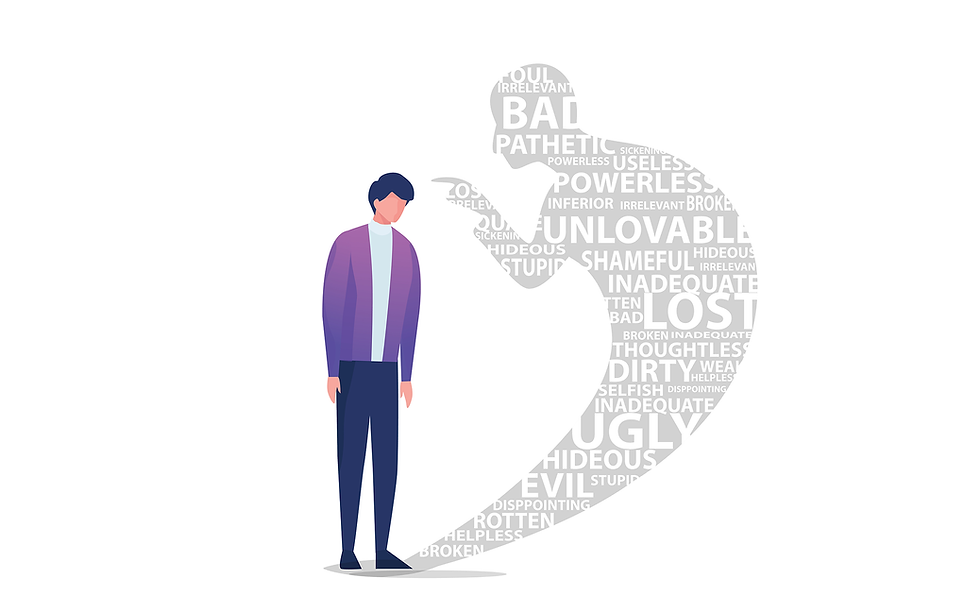Neuron your way to more positive thinking...
- prospectcounselling

- Apr 1, 2019
- 4 min read
Negative Thoughts and How to Stop Them From Taking Over
Put in the simplest term, your thoughts are nothing more than electrical signals which travel through your brain from neuron to neuron. One neuron activates another, and another and so on until thousands have been activated. Neurons that repeatedly fire in a particular sequence become physically connected as a pathway in your brain. This basic premise of neuroscience:
“Neurons that fire together, wire together”
...which is known as Hebb’s Law, provides some explanation around how your brain changes its form and function (neuroplasticity) based on your thoughts, feelings, behaviours and experiences.
Negative thought processes follow this same pattern: The more we think about, or “ruminate,” on a negative thought, the more entrenched that thought becomes in our brain. Negative and distressing thoughts also tend to 'loop' in the sense that they play themselves over and over until you can do something to stop them. Your way that you live your life literally sculpts your brain, and the more that these negative thoughts loop, the stronger the neural pathways which support them become, and the more difficult it becomes to stop them. On the other hand; less active connections wither away. This process is sometimes described as neural Darwinism: the survival of the busiest.
Each time you experience something which triggers your anxiety or negative thought pattern, it is happening because the neurons in your brain have learned to react in this way. An established neural pathway becomes so well defined that the brain eventually works on autopilot.
As soon as you are exposed to even the thought of something that triggers your anxiety, your neurons take over. They send signals telling you that it’s time to panic and then you start to feel the physical and emotional effects of the body reacting to what the brain is telling it to do.
The more that this pattern repeats itself, the more proficient the mind and body become in repeating this behaviour. This is why, if it's not effectively treated, anxiety can get worse and worse over time.
Medication works by targeting the neurons, disrupting these pathways and forcing them to send different signals. This can be a very effective form of treatment for some people but medications don’t always work and they certainly don't address the underlying cause of your anxiety.
Our brains are incredibly powerful and we can actually convince ourselves that medication isn’t going to work. By doing this we create a new pattern of neurons telling our mind that the tablets we are taking won’t have any effect. This negative thinking helps to create new neural pathways which counteract any positive effects the medication has.
Alternatively, people may begin to feel better while taking medication, so they decide to stop taking it. Unfortunately, because they didn't address the thinking patterns which caused the anxiety in the first place, they are likely to slip back into the same old habits which cause the anxiety to come back.
Research has shown us that it is much easier to build new neural pathways rather than to change an old one. By working on consciously altering our reactions to situations we can begin to create new pathways and actually teach our brains to function differently.
Put simply… we break old habits by replacing them with new habits.
The first step in beginning to change the pathways in our mind is to acknowledge that they are there and gain an understanding of how they work. Knowing how your brain works, even at a very basic level will help to lay the groundwork for changing how you deal with stressful situations.
If a neuron fires and isn’t followed by the activation of subsequent neurons, the connection between them begins to weaken. Eventually, your brain breaks the associations and carves new neural pathways.
You can retrain your brain to be less worried, anxious or reactive, by repeatedly associating positive, calm, safe feelings and thoughts with material that is upsetting or anxiety producing for you. One useful task to help you with this is to write a 'Gratitude Journal'...Below you'll find the instructions on how to go about this...
Gratitude Journal
Instructions: Write three entries each day about the things you feel most positive about grateful for. This could be about a person, a job, a task completed, a great meal or trip somewhere, or anything else that comes to mind.
Journaling Tips
• Don’t rush to write down the first thing that comes to your mind. Take time to truly think about what you feel was positive/what you’re grateful for.
• Writing about the people who you’re grateful for tends to be more powerful than writing about things.
• Explain, if you can why you’re grateful. For example, if you’re grateful for a friend who is nice, describe what they do that’s nice, and why that makes you feel positive.
• Aim for three solid entries each day. Keep your journal somewhere you’ll see it, and plan when you can write. Set an alarm on your phone if you think you might forget.
Journaling Prompts
Note: The use of prompts is optional. Feel free to write about anything for which you are grateful but here are some ideas to get you started.
Someone whose company I enjoy… A fun experience I had…
The best part about today has been… An act of kindness I witnessed or received…
A reason to be excited for the future… Someone I can always rely on is…
A valuable lesson I learned today is… Something I can be proud of doing/achieving…
Someone who I admire… An unexpected good thing that happened…
Something beautiful I saw… An experience I feel lucky to have had…

You CAN learn to overcome your anxiety. It just takes the right kind of thinking, patience and time...Good Luck!








Comments